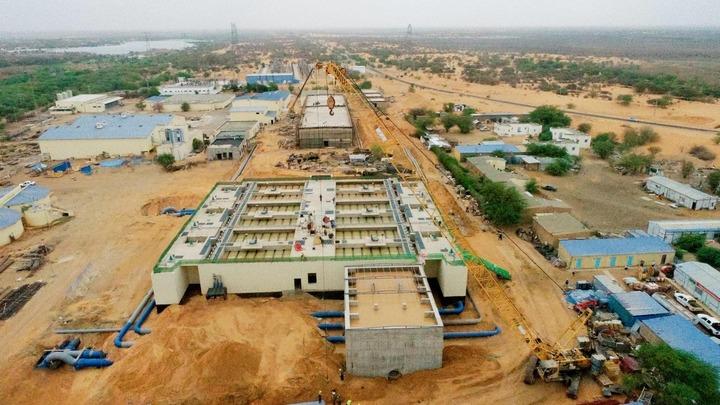An aerial drone photo taken on Aug. 7, 2025 shows the Beni Nadji water pretreatment station in the Trarza region, Mauritania. The Beni Nadji pretreatment project, built by a subsidiary of Power Construction Corporation of China (PowerChina), was officially accepted by the Mauritanian authorities in early August. Mauritania, located in northwest Africa, is approximately 80 percent covered by the Sahara Desert and experiences an arid climate. Its capital, Nouakchott, home to more than 1.5 million people, relies on the Senegal River for water. The raw water is treated at the Beni Nadji water plant before being piped into the city. The new station, with a designed daily capacity of 255,000 cubic meters, is equipped with six sets of high-density sedimentation tanks, a central control room, and intake and outflow structures. (PowerChina/Handout via Xinhua)
NOUAKCHOTT, Aug. 21 (Xinhua) -- Late into the night, Mauritanian Minister of Hydraulics and Sanitation Amal Mint Maouloud stood quietly on the operation platform of the Beni Nadji water pretreatment station in the southwestern Trarza region.
In front of her, six sets of high-density sedimentation tanks entered trial operation as data flickered across the control screens. When the turbidity level finally dropped to a clear 113 nephelometric turbidity units, she breathed a sigh of relief. With a smile, she turned to the technicians beside her and raised a thumbs-up.
The Beni Nadji pretreatment project, built by a subsidiary of Power Construction Corporation of China (PowerChina), was officially accepted by the Mauritanian authorities in early August.
"This project is an optimal water treatment solution, implemented by a Chinese enterprise team after thorough evaluation," Maouloud told Xinhua. "By delivering efficiently under extreme conditions, they have shown true professionalism and responsibility. The project's operation will fundamentally ease summer water shortages in Nouakchott."
Mauritania, located in northwest Africa, is approximately 80 percent covered by the Sahara Desert and experiences an arid climate. Its capital, Nouakchott, home to more than 1.5 million people, relies on the Senegal River for water. The raw water is treated at the Beni Nadji water plant before being piped into the city.
Every rainy season, however, the river's silt and mud levels spike, overwhelming the plant's capacity and leaving residents facing severe water shortages. To address the issue, the government decided to build a raw water pretreatment system at the Beni Nadji plant and entrusted the project to a Chinese company.
The new station, with a designed daily capacity of 255,000 cubic meters, is equipped with six sets of high-density sedimentation tanks, a central control room, and intake and outflow structures. From groundbreaking in January to full operation in July, the project was completed in just seven months.
"This is a project that ensures, even during the rainy season when the Senegal River's turbidity fluctuates dramatically, the government can still guarantee safe drinking water for Nouakchott and surrounding areas," said Sidi Lemine, adviser to the minister, adding that Mauritania plans to promote the experience nationwide.
Construction was not without challenges. Scorching heat and sandstorms accelerated equipment wear and caused frequent malfunctions.
"To adapt to the local environment, the project used corrosion-resistant stainless steel impellers and durable pump components. The control systems were also equipped with higher protection grades," said Chang Yunfei, PowerChina's country representative in Mauritania, noting that key equipment was airlifted and logistics streamlined to ensure construction progress and project quality.
On Aug. 7, the sluice gate was opened. Muddy water from the Senegal River surged through welded steel pipes into the intake basin, then into treatment units. Most entered the high-density sedimentation system, where they went through mixing, flocculation, and settling. Gradually, turbid yellow water turned clear. Monitoring confirmed a significant improvement in water quality.
"This pretreatment station, built to world-class standards in such a short time, is a miracle," said Hadrami Mohamed, a technical expert with the National Water Company.
Project coordinator Kane Mamadou said that Nouakchott will now have a stable supply of clean water even during the most difficult rainy season. "This has greatly eased dispatching pressure and significantly improved people's well-being," he noted.
So far, the project has raised the stability of the drinking water supply in the capital region to 90 percent, created around 80 local jobs, and is expected to significantly reduce waterborne diseases such as cholera and dysentery.
Local daily Al-Akhbar reported that the project will benefit more than 1.5 million people, calling it a "milestone for securing livelihoods and strengthening urban water resilience."
"This pretreatment plant not only demonstrates the engineering strength of Chinese enterprises but also provides a replicable model for treating highly turbid raw water in Africa's arid regions," said Chang. "It delivers clean water and leaves behind a footprint of trust and cooperation."
Chinese Ambassador to Mauritania Tang Zhongdong said the project stands as another testament to the high-quality cooperation between China and Mauritania under the Belt and Road Initiative.
"By deepening pragmatic cooperation and advancing together, our two countries will bring greater benefits to their peoples and inject strong momentum into China-Africa cooperation in the new era," Tang said.
Photo taken with a mobile phone on Aug. 7, 2025 shows workers at the Beni Nadji water pretreatment station in the Trarza region, Mauritania. The Beni Nadji pretreatment project, built by a subsidiary of Power Construction Corporation of China (PowerChina), was officially accepted by the Mauritanian authorities in early August. Mauritania, located in northwest Africa, is approximately 80 percent covered by the Sahara Desert and experiences an arid climate. Its capital, Nouakchott, home to more than 1.5 million people, relies on the Senegal River for water. The raw water is treated at the Beni Nadji water plant before being piped into the city. The new station, with a designed daily capacity of 255,000 cubic meters, is equipped with six sets of high-density sedimentation tanks, a central control room, and intake and outflow structures. (PowerChina/Handout via Xinhua)




 A single purchase
A single purchase









